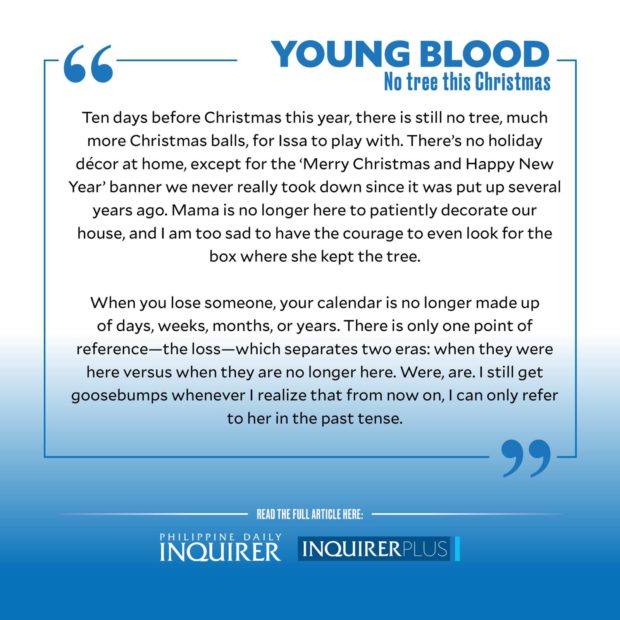Last year’s holiday season was a blur. It was the first Christmas after COVID-19 made social gatherings unsafe for everyone. I remember burying my head in law books for finals and promising to help my mom set up the Christmas decorations.
I felt guilty about my promise when I saw the tree up one day, completely decorated. She always looked forward to the holidays, and maybe was too excited to feel the Christmas spirit that she couldn’t wait for me.
Problem is, our then five-month-old kitten, Issa, kept reaching for the Christmas balls, and our tiny five-foot tree could not hold the kitten’s weight. It was a sight for us to watch Issa climb the tree, tearing every décor she could reach. It was a different story for my mom who actually put up the tree. I caught the naughty cat on video once and I’ve been replaying this video more often the past week. In the background, I can hear my mother ask, “Kapag binuksan kaya yung Christmas lights, aakyat pa rin siya?”
Ten days before Christmas this year, there is still no tree, much more Christmas balls, for Issa to play with. There’s no holiday décor at home, except for the “Merry Christmas and Happy New Year” banner we never really took down since it was put up several years ago. Mama is no longer here to patiently decorate our house, and I am too sad to have the courage to even look for the box where she kept the tree.
When you lose someone, your calendar is no longer made up of days, weeks, months, or years. There is only one point of reference—the loss—which separates two eras: when they were here versus when they are no longer here. Were, are. I still get goosebumps whenever I realize that from now on, I can only refer to her in the past tense.
Before the pandemic, the two of us always attended Simbang Gabi. There is a belief that if you can attend all nine Masses, your prayer will come true. We completed the streak only once or twice, as there was always a day when either of us (or both) would not be able to wake up, or was too sleepy to attend Church at 3:30 a.m.
Since the word “cancer” became familiar to us, I always prayed that she’d be one of the inspirational stories of recovery.
We know how that ended.
During her last days, frustration overtook her. She told me, “Sometimes I ask God why I have to suffer like this.” It was a plain and simple question; there was no hint of bitterness or anger. She was the most faithful person I knew; even in her pain, she believed that God would provide her the healing she needed.
Five months since she died, I still don’t know the answer. Maybe I never will.
This pandemic has made us realize how everything is temporary. Death is the only certain thing, yet we continue to avoid it until it slaps us in the face. We take everything for granted until death takes everything away from us and pokes a heavy hole in our chest. It leaves us with regret, forever wondering what it would take to be whole again, even for just a day.
Today, instead of the Christmas tree, we have her framed picture from 2016, the year before she was diagnosed with cancer—her thick hair dyed black, her cheeks plump, her skin glowing. In the following years, she would become a lot thinner and her hair shorter. What never changed was her grateful and hopeful smile that there would be more Christmases with us.
For now, the poinsettias will be replaced with roses and the Christmas balls with candles. I know the smell of the house will be different on the 24th without her in the kitchen. No matter which recipe for spaghetti I follow, it will never be the same as the one she cooked. Food was her love language and it was one we all enjoyed, holiday or not. Noche buena will feel incomplete, like all the other meals we’ve had, with her empty seat at the dining table.
But we’ll “celebrate” for sure. We’ll remember all the other Christmases we had with her—her smile at the sight of a gift, her voice when telling us we’d be late for Mass, her “Merry Christmas, I love you,” at midnight, the warmth of her hug.
But among all my memories of her, I’ll always remember that even when she was in pain, she made sure we had a beautiful Christmas tree.
—————-
Yvette B. Morales, 25, is a graduate student and a frustrated writer. Her cat, Issa, keeps her grateful for life.
